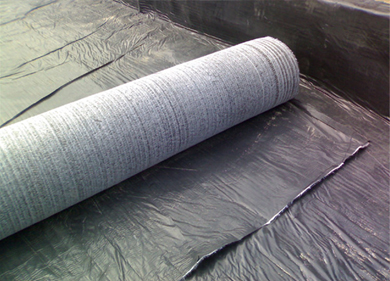Benefits of Bentonite Clay Blankets
2024-06-27
Bentonite clay blankets, also known as Geosynthetic Clay Liners (GCLs), are composite materials used primarily for environmental containment and waterproofing applications. These blankets are made by sandwiching a layer of bentonite clay between two layers of geotextiles or geomembranes. Here are the key benefits of using bentonite clay blankets:
Benefits of Bentonite Clay Blankets
1. Superior Waterproofing:
- Low Permeability: Bentonite clay swells when it comes into contact with water, creating a low-permeability barrier that effectively prevents water infiltration.
- Self-Sealing Properties: The swelling action of bentonite clay allows it to self-seal small cracks and punctures, enhancing the integrity of the waterproofing barrier.
2. Environmental Protection:
- Containment of Contaminants: Bentonite clay blankets are highly effective at containing contaminants, making them ideal for use in landfills, wastewater treatment facilities, and hazardous waste containment.
- Prevention of Leachate Migration: In landfill applications, they prevent leachate migration into the surrounding soil and groundwater, protecting the environment.
3. Durability and Longevity:
- Resistance to Chemical Degradation: Bentonite clay is chemically stable and resistant to a wide range of chemicals, ensuring long-term performance.
- UV and Weather Resistance: When properly covered or installed, bentonite clay blankets are resistant to UV radiation and weathering, contributing to their durability.
4. Ease of Installation:
- Flexible and Adaptable: The flexible nature of bentonite clay blankets allows them to conform to irregular surfaces and complex site geometries, simplifying installation.
- Quick Deployment: They are typically supplied in rolls that can be easily unrolled and positioned, speeding up the installation process.
5. Cost-Effective Solution:
- Lower Installation Costs: Compared to traditional compacted clay liners, bentonite clay blankets require less material and labor for installation, reducing overall costs.
- Reduced Maintenance: The self-sealing properties and durability of bentonite clay blankets minimize the need for ongoing maintenance and repairs.
6. Versatility:
- Wide Range of Applications: Suitable for various applications, including landfills, ponds, lagoons, reservoirs, canals, and secondary containment systems.
- Compatibility with Other Materials: Can be used in conjunction with geomembranes, geotextiles, and other geosynthetic materials to enhance performance in specific applications.
7. Sustainability:
- Natural Material: Bentonite clay is a natural material, making it an environmentally friendly option for containment and waterproofing.
- Recyclable and Reusable: In some applications, bentonite clay blankets can be recycled or reused, reducing waste and promoting sustainability.
8. High Performance:
- Consistent Quality: Manufactured under controlled conditions to ensure consistent quality and performance.
- Reliable Performance: Proven track record in a variety of environmental and civil engineering projects, demonstrating their reliability and effectiveness.
Applications
1. Landfills:
- Base Liners and Caps: Used as base liners to prevent leachate migration and as caps to minimize water infiltration and gas emission.
- Leachate Ponds: Containment of leachate ponds to prevent contamination of surrounding areas.
2. Water Containment:
- Ponds and Reservoirs: Waterproofing of ponds, reservoirs, and irrigation canals to prevent water loss and contamination.
- Stormwater Retention: Used in stormwater retention ponds to control runoff and manage water quality.
3. Mining:
- Tailings Ponds: Containment of tailings ponds to prevent leakage of hazardous materials into the environment.
- Heap Leach Pads: Used in heap leach pads to control the movement of leachate and prevent contamination.
4. Construction:
- Basements and Foundations: Waterproofing of basements and foundations to prevent water ingress and protect structural integrity.
- Tunnel Linings: Waterproofing of tunnels and underground structures.
5. Environmental Remediation:
- Containment Barriers: Used in environmental remediation projects to contain and isolate contaminated soil and groundwater.
- Secondary Containment: Secondary containment systems for chemical storage tanks and industrial facilities to prevent environmental contamination.
Bentonite clay blankets provide a reliable, cost-effective, and environmentally friendly solution for a wide range of containment and waterproofing applications, ensuring long-term protection and performance.



